Question
Blackwell Corporation (BC) has signed two leases in 20X1. One lease is for a security system, the other for a delivery truck. Both leases were
Blackwell Corporation (BC) has signed two leases in 20X1. One lease is for a security system, the other for a delivery truck. Both leases were signed on 01 January 20X1.
The security system has a fair market value of $51,244. Lease payments are made every year on January 1st. The lease is a two-year arrangement, requiring payments of $15,000 per year, and can be renewed for subsequent one-year term up to three times, at a rental cost of $10,000. At the end of the lease arrangement, the security system reverts to the lessor. If BC decides not to renew the lease contract at each renewal date, a penalty of $40,000 must be paid to the lessor. Whereas BC can purchase the security system for an amount equal to its fair value at the end of each lease term, it does not have the intention to exercise this option. The security system has a useful life of seven years, but since technology changes so quickly, the security system could be out of date after five years, but still be usable by the company. BC does not foresee the need to continually upgrade to state-of-the-art technology. BC knows that the implicit rate in this lease contract is 10%. There are no restrictions on the use of the system. Professional fees of $500 were paid to structure the contract.
The delivery truck has a fair value of $72,455. The annual lease payments are $15,600. The lease also required a one-time upfront payment of $5,000, due and paid on 1 January 20X1, the day the lease was signed. The lease is a four-year lease. If more than 55,000 kilometers are put on the truck in any one-year period, a payment of $0.30 per extra kilometer must be paid in addition to the annual rental. All maintenance costs are covered by warranty.
At the end of the lease term, the truck reverts to the lessor, who will either sell the truck or re-lease it. The expected residual value currently is $20,000. BC is not aware of this expected residual value and thus ignores the implicit rate in this contract. The truck has an estimated 10-year useful life. There are no restrictions on the use of the truck.
The company uses straight-line depreciation for all assets. BC has a 9% incremental borrowing rate.
Assume that 62,000 kilometers were put on the truck in 20X1 and 65,000 kilometers in 20X2. The additional contingent rental due for one year was paid in February of the following year.
1) Prepare a comparative partial income statement, a comparative partial balance sheet and a comparative partial cash flow statement for 20X1 and 20X2 showing the accounts and amounts related to these two contracts. Clearly state any necessary assumptions and provide all your calculations.
Step by Step Solution
There are 3 Steps involved in it
Step: 1

Get Instant Access to Expert-Tailored Solutions
See step-by-step solutions with expert insights and AI powered tools for academic success
Step: 2

Step: 3

Ace Your Homework with AI
Get the answers you need in no time with our AI-driven, step-by-step assistance
Get Started


